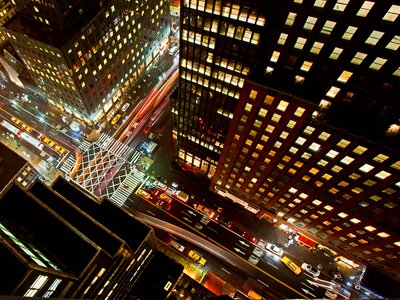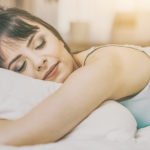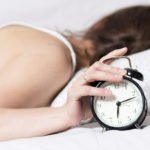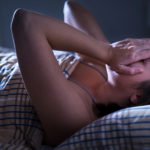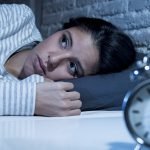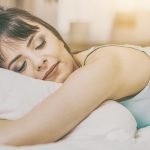Dogs generally sleep when there’s nothing else to do, and that might also be the case with people. At least, that’s one explanation for the significant differences in sleep patterns from one city to the next across the US, and also, across the globe.
A new study just found that people in the bustling metropolis of New York go to bed later than anywhere else in the nation. In Brooklyn, average tuck-in time is 12:07 am, followed by Manhattan at 11:55.1 Mail Online Reporter. “No sleep in Brooklyn! But everyone’s tucked up in bed by 10.45pm in Arizona and Hawaii. Fascinating map reveals America’s bedtimes.” 8 October 2014. Mail Online Reporter. 13 October 2014. http://www.dailymail.co.uk/news/article-2785112/No-sleep-Brooklyn-New-York-borough-stays-latest-nation-Hawaiians-bed-10-45pm.html Given that clubs and late-night restaurants and evening shows abound in the Big Apple, it’s really no surprise that there’s an audience to frequent the joints. Also super-late to bed is Miami, with an average bedtime of 11:54, followed by Atlantic City, at 11:53. Miami also has a lively nightlife scene, and Atlantic City, of course, has the slots. So does Las Vegas, which ranks next with an 11:49 bedtime, and then New Orleans, where most lights go out at 11:47.
Not surprisingly, college campuses also showed late bed-times, even when in “the sticks.” That might reflect the number of students who stay up late studying, or it might indicate a lot of partying. At Indiana University, bedtime averages 11:53; at Ithaca College and Cornell, it’s 11:48; and at Penn State it’s 11:43.
At the other extreme, the sluggards in Hawaii turn in a full hour-and-a-half earlier. Earliest of all are Maui and Kauai islands, where the average bedtimes are 10:31 and 10:33, respectively. A Kauai tee-shirt bearing the slogan “Kauai Night Life” pictures the moon and stars in the sky. In other words, you won’t find much happening after dark on “The Garden Island,” and so residents simply turn in.
“I’m afraid to call anyone after 9:30 or so at night, because I don’t want to wake them,” says Kauai resident Dave Rosenberg.
If early to bed leads to “early to rise” so, apparently does “late to bed.” None of the major cities included in the survey showed an average of more than seven hours of sleep per night, the absolute minimum recommended by the National Institutes of Health. In New York, for example, the average was 6.82 hours. In Maui and Kauai, on the other hand, residents averaged at least 7.3 hours a night.
The study data was collected from one million people who agreed to wear electronic activity trackers on their wrists.2 Kim, Susanna. “Cities’ Bedtime Revealed in One Map.” 8 October 2014. ABCNews. 8 October 2014. http://abcnews.go.com/Business/map-claims-show-people-sleep/story?id=26042978 Overall, the trackers showed that participants in cities slept less than those in rural areas.
It’s possible that there’s a link between the varying sleep schedules and health outcomes. According to the United Health Foundation and the American Public Health Association, Hawaii ranks number two for healthiest spot in the nation. New York City, on the other hand, does not rank at all on the Forbes list of the 20 healthiest cities in the nation.3 “America’s 20 Healthiest Cities.” Forbes. 8 October 2014. http://www.forbes.com/pictures/eigl45hfh/1-minneapolis-minn/ Nor did NYC make Prevention’s list of the 25 happiest, healthiest spots, but Honolulu did.4 Mahoney, Karen and Coenen, Susan. 25 Happiest, Healthiest Cities in America.” Prevention. 8 October. 2014. http://www.prevention.com/mind-body/emotional-health/25-happiest-healthiest-cities-america And-bottom line- in the CDC’s mortality rates by state data, Hawaii shows the lowest mortality rates in the nation.5 “Mortality Rates by State.” http://www.governing.com/gov-data/health/mortality-rates-by-state.html No straight line connects early bed times to low mortality rates, but it’s an interesting phenomenon to note. Then again, stress might be a factor. Most people would probably agree that NYC is a more stressful place to live than Maui.
Of course, tucking in early doesn’t guarantee good sleep. Americans are among the most sleep deprived people in the world, and that’s due to insomnia as much as short sleep hours. According to a study out of the Philips Center for Health and Well-Being in Amsterdam, stress causes the majority in the US to toss and turn.6 oud, Carol. “Which Country is the Most Sleep Deprived?” 12 November 2010. Sleepio Blog. 8 October 2014. http://www.sleepio.com/blog/2010/11/12/which-country-is-the-most-sleep-deprived/ The study found that 74 percent of US adults lie in bed at night worrying about the economy, with 66 percent specifically worried about healthcare bills.
On the other hand, the most recent surveys show Asians outpacing Americans in the sleep-deprivation category. Japan is the most sleep-deprived country in the world, with Japan, Korea, and Singapore ranking one, two and three, respectively.7 Cain, Jeffrey. “Why the Japanese Live So Long.” 13 June 2014. Repubhub. 8 October 2014. http://repubhub.icopyright.net/freePost.act?tag=3.13011?icx_id=6174903 Tokyo residents average just five hours and 44 minutes of sleep a night. By that standard, New Yorkers are downright slothful. On the other hand, the average life expectancy for Japanese women is 86.39 years; for men, it’s 79.82 years.8 http://stats-japan.com/t/categ/50006 In the US, it’s 81.17 for women and 75.96 for men. Experts suggest that perhaps it’s their diet that makes Japanese so long-lived; and native Japanese, with the exception of Takeru Kobayashi, tend to eat far smaller portions than we do in the US.9 http://en.wikipedia.org/wiki/Takeru_Kobayashi Or perhaps it’s the superior care elders get in that nation. In any event, clearly, sleep deprivation isn’t cutting short Japanese lives, or at least, there are other factors at play.
But is the data reliable? If the manufacturers of sleep tracking devices can be believed, at least the data tracking sleep patterns from city to city is quite sound. Jawbone, the maker of the device used in the US study, claims that its gadget can not only detect when you’re asleep and when you’re awake (which would be a boon to Santa Claus), it can also differentiate between light sleep and deep sleep.10 http://www.prnewswire.com/news-releases/jawbone-unveils-new-data-from-sleep-behavior-study-up-features-and-caffeine-tracker-to-demonstrate-the-impact-of-sleep-on-everyday-life-248742331.html A competitor’s device allows users to track connections between diet, exercise, weight and sleep patterns. The devices track sleep via accelerometers which measure arm movements during the night. This information can be downloaded to your computer giving you juicy, colorful charts of your sleep patterns — enough to keep you up at night.
Of course, the device manufacturers backtrack when it comes to making any absolute claims. They say that if you have a serious sleep problem, such as sleep apnea, no device is a substitute for getting tested in a sleep lab and seeking medical advice. And while these devices can give you a baseline to work from in adjusting your lifestyle to improve the quality of your sleep, you might save a few bucks and get the same results by increasing your exercise, reducing your sugar and caffeine intake, losing some weight, and abstaining from any A/V media before you go to bed.
References
| ↑1 | Mail Online Reporter. “No sleep in Brooklyn! But everyone’s tucked up in bed by 10.45pm in Arizona and Hawaii. Fascinating map reveals America’s bedtimes.” 8 October 2014. Mail Online Reporter. 13 October 2014. http://www.dailymail.co.uk/news/article-2785112/No-sleep-Brooklyn-New-York-borough-stays-latest-nation-Hawaiians-bed-10-45pm.html |
|---|---|
| ↑2 | Kim, Susanna. “Cities’ Bedtime Revealed in One Map.” 8 October 2014. ABCNews. 8 October 2014. http://abcnews.go.com/Business/map-claims-show-people-sleep/story?id=26042978 |
| ↑3 | “America’s 20 Healthiest Cities.” Forbes. 8 October 2014. http://www.forbes.com/pictures/eigl45hfh/1-minneapolis-minn/ |
| ↑4 | Mahoney, Karen and Coenen, Susan. 25 Happiest, Healthiest Cities in America.” Prevention. 8 October. 2014. http://www.prevention.com/mind-body/emotional-health/25-happiest-healthiest-cities-america |
| ↑5 | “Mortality Rates by State.” http://www.governing.com/gov-data/health/mortality-rates-by-state.html |
| ↑6 | oud, Carol. “Which Country is the Most Sleep Deprived?” 12 November 2010. Sleepio Blog. 8 October 2014. http://www.sleepio.com/blog/2010/11/12/which-country-is-the-most-sleep-deprived/ |
| ↑7 | Cain, Jeffrey. “Why the Japanese Live So Long.” 13 June 2014. Repubhub. 8 October 2014. http://repubhub.icopyright.net/freePost.act?tag=3.13011?icx_id=6174903 |
| ↑8 | http://stats-japan.com/t/categ/50006 |
| ↑9 | http://en.wikipedia.org/wiki/Takeru_Kobayashi |
| ↑10 | http://www.prnewswire.com/news-releases/jawbone-unveils-new-data-from-sleep-behavior-study-up-features-and-caffeine-tracker-to-demonstrate-the-impact-of-sleep-on-everyday-life-248742331.html |

